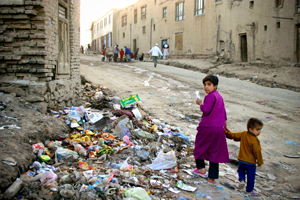
Asia’s drive to urbanize is taking an increasing toll on the environment with growing mountains of solid waste as city dwellers consume and discard resources at an ever increasing rate. If “green” cities are to be the answer to these environmental stresses then they will need to develop much more effective programs to reduce, reuse, recycle and recover waste.
While recycling helps to manage solid waste, reducing consumption and minimizing waste should be our ultimate goal. By minimizing waste we reduce demand for landfill space, save resources and energy, reduce pollution, and increase the efficiency of production. It is a moral imperative for each one of us to be more mindful of waste each time we make a purchase. Do we really need all those disposable plastic bags, plastic cups, and plastic bottles? Is it absolutely necessary to have fancy product packaging?
Waste not, want not
As simple as it sounds, however, waste minimization is difficult to achieve because it requires a change in mindset, in culture even. After all, for any real change to take place there must be a revolution, which really begins with a collective change of perception. The people have to want it. And therein lies the challenge.
Expecting people to reduce, reuse, or recycle simply because it’s the right thing to do is an ideal. Most of us are caught up in the culture of consumerism, which dictates the need for things to be “consumed, burned up, worn out, replaced, and discarded at an ever-increasing pace.” This culture emerged to justify increased production (and to curb the threat of overproduction) of manufactured goods in the US after World War II.
In response to excessive consumerism, governments can either issue regulations to reduce consumption or provide incentives to people to consume less and to reduce their waste. In the US, San Francisco has drawn up ordinances to encourage communities and businesses to waste less. This includes a regulation put in place in 2009 for residents and businesses to compost food scraps and dirty napkins by throwing them into bins provided by the city. The city’s collection agency then sells the organic compost. Another regulation requires construction and demolition crews to recycle or reuse 65% of leftover materials from building sites.
Other measures helping take San Francisco closer to its goal of 100% zero-waste by 2020, are requiring businesses to charge customers 10 cents per paper bag purchased, and a ban on plastic bottled water sales on municipal property.
Reducing wasteful packaging
Despite such regulations, however, San Francisco and other city governments going down the green path will have to work with manufacturers to reduce and alter packaging to reduce the last 10% of waste.
Singapore, as part of its drive to end landfills, launched the first Singapore Packaging Agreement in 2007 to reduce packaging waste, which makes up about one third of its total domestic waste. The agreement provides a mechanism for industries to reduce packaging waste. While the initial agreement was voluntary, the signatories expressed their interest in continuing it and a second pact took effect in 2012. As of July 2013, the 128 signatories had cumulatively reduced their packaging waste by 14,900 tons, saving an equivalent of about $31 million.
For industries yet to cut down on packaging waste, consumers, of course, have the power to effect change with their purchases. By buying products with simpler, biodegradable packaging, we as individuals can ultimately pressure manufacturers to become less wasteful and more environmentally conscious. The answer to truly green cities is in our hands.
This article was first published by the ADB Development Blog.







Consumerism is the ill of the west which has been passed down to Asia which is so eager to absorb all that is in the name of development and globalisation. The villages in Asia through the eons have learned to minimise, economise and have a sustainable living. Perhaps I am errant in the use of ‘Asia’, but atleast in India for many many years the motto was ‘sustainable living’ in an agrarian economy.’